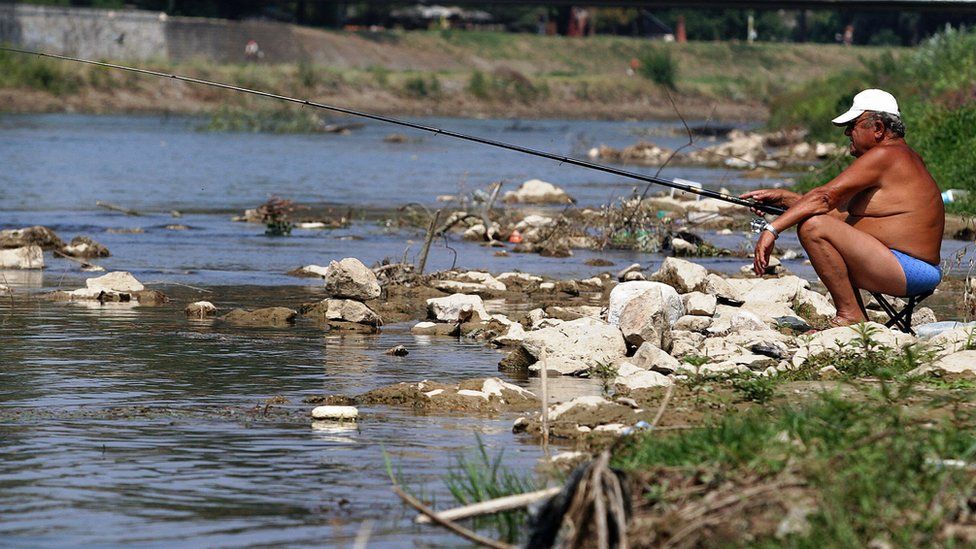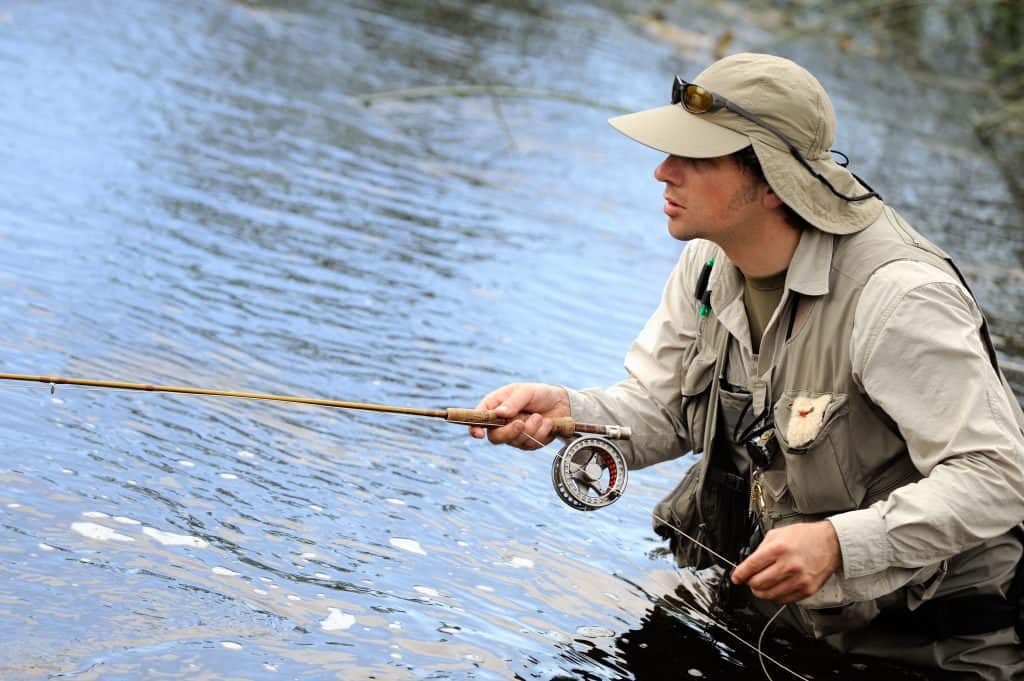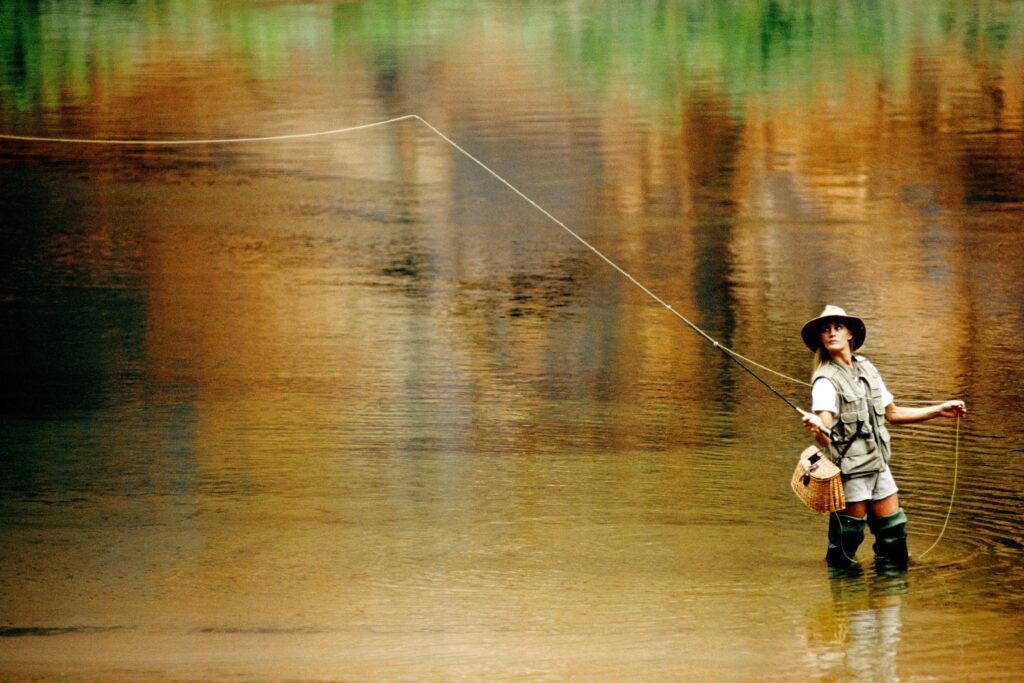Have you ever wondered if fly fishing is considered an Olympic sport? Well, here’s the answer you’ve been waiting for. Despite its popularity among outdoor enthusiasts and the sheer beauty of the sport, fly fishing has yet to make its debut at the Olympic Games. However, that doesn’t mean it hasn’t caught the attention of passionate anglers around the world, and there’s a growing movement advocating for its inclusion in future competitions. So, let’s explore the potential and allure of fly fishing as we delve into this captivating question.

This image is property of britishseafishing.co.uk.
History of the Olympic Games
Ancient origins of the Olympic Games
The Olympic Games have a rich and storied history, with their origins dating back to ancient Greece. The ancient Olympic Games were held every four years in Olympia, beginning in 776 BC, as part of religious festivals honoring the Greek gods. The athletic competitions brought together athletes from various Greek city-states, promoting unity and celebrating the physical prowess of individuals. These ancient games included events such as running, wrestling, chariot racing, and discus throwing.
Creation of the modern Olympic Games
After centuries of absence, the idea of reviving the Olympic Games gained momentum in the late 19th century. Inspired by the ancient Games, a French educator named Baron Pierre de Coubertin spearheaded efforts to establish the modern Olympic Games as a way to promote international understanding and peace. In 1894, the International Olympic Committee (IOC) was formed, and in 1896, the first modern Olympic Games took place in Athens, Greece. This marked the beginning of a global sporting event that would capture the world’s attention every four years.
Inclusion of new sports in the Olympic program
Over the years, the Olympic Games have evolved and adapted to embrace new sports and reflect the changing interests of athletes and spectators. The IOC, in collaboration with international sports federations, continuously reviews and modifies the Olympic program to ensure its relevance and appeal. New sports are periodically added to the program, while some traditional sports may be removed or altered. This inclusive approach allows the Olympic Games to remain dynamic and responsive to the needs and aspirations of athletes worldwide.
Sports Eligible for the Olympics
Criteria for inclusion in the Olympic Games
The Olympic Games feature a wide variety of sports, each demonstrating unique athleticism and skill. To be considered for inclusion in the Olympic program, a sport must meet certain criteria outlined by the IOC. These criteria include the sport’s global popularity, its adherence to Olympic values, the existence of a recognized international federation governing the sport, and the presence of gender equality in its competitions. Additionally, the IOC assesses the sport’s infrastructure, anti-doping measures, and the overall impact it would have on the Olympic movement.
Summer and Winter Olympic sports
The Olympic Games consist of both Summer and Winter editions, with each edition showcasing different sports. The Summer Olympics, held every four years, feature a diverse range of athletic disciplines, including track and field, swimming, gymnastics, and team sports such as basketball and soccer. The Winter Olympics, also held every four years but in a different cycle from the Summer Games, highlight winter sports such as skiing, ice hockey, figure skating, and snowboarding. This division allows for a balanced representation of sports throughout the Olympic calendar year.
Distinctive characteristics of Olympic sports
One of the defining characteristics of Olympic sports is their universal appeal and popularity across different nations and cultures. Olympic sports often embody values such as fairness, achievement, and excellence, making them recognizable and relatable to people worldwide. These sports also undergo continuous development and technological advancements, exemplifying the desire for progress and continuous improvement. The Olympic Games serve as a platform for athletes to showcase their skills and compete against the best in the world, fostering a spirit of friendly competition and international camaraderie.
Overview of Fly Fishing
Definition and origins of fly fishing
Fly fishing is a unique angling technique that uses artificial flies as bait to entice fish. The sport traces its origins back to ancient times when people discovered that tying feathers, fur, and other materials onto fishing hooks can imitate insects and attract fish. Fly fishing evolved over the centuries and gained popularity as a recreational activity, a means of survival, and a form of art. It requires skillful casting techniques and a deep understanding of the behavior of fish and their habitat, making it a challenging yet rewarding pursuit for enthusiasts.
Types of fly fishing techniques
Fly fishing encompasses various techniques, each suited to different fishing environments and target species. The most common technique is dry fly fishing, where anglers cast lightweight flies that float on the water’s surface, imitating insects that land on the water. Nymph fishing involves fishing subsurface, using weighted flies that resemble aquatic nymphs. Streamer fishing, on the other hand, involves using larger, more vibrant flies that mimic small fish or baitfish, enticing predatory species. Each technique requires specific casting skills, knowledge of fish behavior, and an understanding of the prevailing conditions.
Popular destinations for fly fishing
Fly fishing has gained popularity globally due to the accessibility of rivers, lakes, and other bodies of water. There are various destinations renowned for their outstanding fly fishing opportunities. For example, the rivers and streams of Montana in the United States provide excellent trout fishing experiences. Scotland offers unparalleled salmon fishing in its pristine rivers, while New Zealand’s crystal-clear lakes and rivers attract fly anglers with the promise of trout and salmon. Iceland, Argentina, and the rivers of Patagonia are also sought-after destinations for fly fishing enthusiasts, offering diverse and challenging angling experiences.
Inclusion of Non-Traditional Sports
Efforts to expand the Olympic program
The Olympic movement has always embraced the inclusion of new and non-traditional sports that reflect the changing interests and aspirations of athletes worldwide. In recent years, there has been a concerted effort to expand the Olympic program by incorporating sports that may not fit the traditional mold but demonstrate remarkable athleticism and appeal to a broad audience. This inclusive approach aims to attract new participants, engage younger generations, and promote diversity within the Olympic Games.
Examples of non-traditional sports in the Olympics
Several non-traditional sports have successfully broken into the Olympic program in recent editions. One notable example is skateboarding, which made its Olympic debut in the 2021 Tokyo Games. This urban sport, popular among young athletes, combines creativity, athleticism, and risk-taking to perform impressive tricks and maneuvers on a skateboard. Another example is surfing, which will be included in the upcoming Summer Olympics in Paris 2024. Surfing showcases the harmony between athletes and nature, highlighting the connection between sport and the environment.
Impact of non-traditional sports on the Olympic movement
The inclusion of non-traditional sports in the Olympic program has had a profound impact on the Olympic movement. It has opened doors to athletes from different backgrounds and introduced new fan bases to the Games. These sports often attract a youthful audience, injecting energy and excitement into the Olympic stage. Furthermore, non-traditional sports contribute to the diversification of the Olympic program, showcasing the evolution of athletic disciplines and capturing the spirit of innovation that characterizes our contemporary world.

This image is property of ichef.bbci.co.uk.
The Debate Surrounding Fly Fishing
Advocates for fly fishing as an Olympic sport
There are passionate advocates who argue that fly fishing should be included as an Olympic sport. They believe that fly fishing meets the criteria set by the IOC, such as global popularity, fair competition, and adherence to Olympic values. They highlight the skill and expertise required in fly casting and the intricate knowledge anglers possess about fish behavior and habitats. Advocates argue that fly fishing represents a unique blend of physical and mental prowess, making it worthy of Olympic recognition.
Arguments against fly fishing in the Olympics
Opponents of fly fishing becoming an Olympic sport raise a variety of concerns. They argue that fly fishing is predominantly a leisure activity and lacks the competitive structure that other Olympic sports possess. Unlike traditional Olympic sports, fly fishing does not have standardized rules and regulations across different regions. Some opponents also question the universal appeal of fly fishing, suggesting that it may not resonate with audiences worldwide in the same way as more widely recognized sports.
Challenges and concerns
If fly fishing were to be included in the Olympic program, there are several challenges and concerns that would need to be addressed. One concern is the potential impact on fish populations and ecosystems. The catch-and-release nature of fly fishing may raise ethical questions and necessitate strict guidelines to ensure sustainable fishing practices. Additionally, the infrastructure and resources required to host fly fishing competitions on a global scale would need to be carefully considered to ensure fairness and accessibility.
Fly Fishing Competitions and Organizations
International fly fishing competitions
Fly fishing competitions have gained popularity worldwide and are often organized at national and international levels. The Fédération Internationale de la Pêche Sportive Mouche (FIPS-Mouche) is the international governing body for competitive fly fishing. It oversees events such as the World Fly Fishing Championships, where teams from different countries compete in various disciplines, including river, lake, and team competitions. These events showcase the skills and abilities of fly anglers and provide opportunities for camaraderie and cultural exchange among participants.
Federation of Fly Fishers and other organizations
The Federation of Fly Fishers (FFF), based in the United States, is a respected organization dedicated to promoting and preserving the art of fly fishing. The FFF offers educational programs, certification for fly casting instructors, and conservation initiatives to ensure the sustainability of fish habitats. Other countries and regions also have fly fishing organizations that foster community engagement, organize local competitions, and advocate for the protection and preservation of fisheries worldwide.
Regulations and standards in fly fishing competitions
To ensure fair play and standardized competition, fly fishing competitions adhere to specific regulations and standards. These include criteria for measuring and scoring catches, rules regarding the equipment and flies used, and guidelines for anglers’ conduct during competitions. Judges and referees oversee competitions, enforcing these regulations and ensuring a level playing field. These standards provide a framework for competitions, allowing anglers to compete based on their skills and knowledge, rather than external factors.

This image is property of outdoortroop.com.
Potential Benefits of including Fly Fishing in the Olympics
Attracting new participants and audiences
Including fly fishing in the Olympic program could attract a new wave of participants to the sport. The prestige and recognition associated with the Olympics may inspire aspiring anglers to take up fly fishing, contributing to the growth and development of the sport. Additionally, the broader exposure and media coverage of fly fishing during the Olympics could capture the interest of audiences who may not have previously considered or been aware of the sport, further expanding its popularity and promoting active engagement.
Promoting environmental awareness and conservation
Fly fishing is closely tied to natural environments, making it an ideal sport to raise awareness about environmental conservation. The Olympic platform could offer an opportunity to highlight the importance of preserving aquatic ecosystems and sustainable fishing practices. The inclusion of fly fishing in the Olympics can underscore the need for responsible angling, habitat protection, and the promotion of clean water initiatives, creating a lasting impact on environmental consciousness and encouraging individuals to be stewards of our planet.
Economic impact and tourism
Hosting fly fishing competitions as part of the Olympic Games can have significant economic benefits for the host city and region. The influx of athletes, officials, and spectators would stimulate the local economy through increased tourism, accommodation bookings, and spending on hospitality, dining, and recreational activities. Fly fishing enthusiasts from around the world may also choose to visit the host region to experience its fly fishing opportunities firsthand, further boosting tourism revenues and creating long-term economic sustainability for the area.
Criteria for Fly Fishing to become an Olympic Sport
International recognition and governing body
For fly fishing to be considered for inclusion in the Olympic program, it would require international recognition as a legitimate sport. The presence of a recognized governing body, such as FIPS-Mouche, demonstrates the global organization and oversight necessary to ensure fair and standardized competition. International recognition would validate fly fishing as a sport worthy of Olympic status and provide a framework for collaboration with the IOC and other international sports federations.
Global participation and accessibility
An Olympic sport should have global participation, with athletes from diverse countries and backgrounds competing at the highest level. Fly fishing’s inclusion in the Olympic program would require widespread participation from various regions around the world. Efforts must be made to promote and develop fly fishing in countries where it may be less prevalent, ensuring equal opportunities for athletes from all nations to participate and qualify for the Olympics. Accessibility to training facilities, competitions, and resources should also be prioritized to create a level playing field for all participants.
Fair and standardized competitive aspects
To be accepted as an Olympic sport, fly fishing must establish fair and standardized competitive aspects. This includes the development of universally recognized rules and regulations governing fly fishing competitions. Consistency in scoring, measurements, equipment guidelines, and athlete conduct would ensure equal opportunities and uniformity in judging. International collaboration between fly fishing organizations and the IOC would be essential to establish these standards and ensure the integrity and legitimacy of the sport within the Olympic framework.

This image is property of www.thetimes.co.uk.
Case Studies: Similar Sports in the Olympics
Sailing and rowing as water-based sports
Sailing and rowing are examples of sports that share similarities with fly fishing in various aspects. Both sailing and rowing require technical skills and physical exertion, involving water-based activities. Like fly fishing, they embody a deep connection between athletes and their surroundings, whether it be the water, wind, or current. These sports have successfully integrated into the Olympic Games, showcasing the diversity of aquatic disciplines and highlighting the importance of teamwork, skill, and strategy.
Archery as a precise target sport
Archery provides another parallel to fly fishing as an Olympic sport. Both sports require exceptional precision and focus, with athletes aiming at specific targets. In archery, the bullseye is the objective, while in fly fishing, anglers target specific areas of water to entice fish. The inclusion of archery in the Olympic program has demonstrated the ability of a specialized target sport to capture the interest of audiences worldwide and showcase the incredible skill and accuracy of its participants.
Skiing and snowboarding as winter sports
Skiing and snowboarding offer insights into the potential inclusion of fly fishing as a winter sport in the Olympic Games. Just as skiing and snowboarding have become established winter disciplines, incorporating activities such as fly fishing on frozen rivers and lakes could further diversify the Winter Olympics. These sports share a connection to nature, requiring athletes to navigate challenging terrains and overcome environmental conditions. By expanding the scope of winter sports, the Olympics can embrace both traditional and non-traditional winter activities, fostering additional interest and enthusiasm among athletes and spectators alike.
Conclusion
The question of whether fly fishing should be regarded as an Olympic sport is a topic that elicits passionate discussions and consideration. As we reflect on the history and evolution of the Olympic Games, it becomes evident that the Games have continually evolved to incorporate new sports and adapt to changing times. Fly fishing, with its unique blend of skill, connection to nature, and global appeal, presents a strong case for consideration as an Olympic sport. While it may face challenges and require careful consideration of criteria and standards, the potential benefits it brings to attracting new participants, raising environmental awareness, and stimulating economic growth are worth exploring. The future prospects and possibilities for fly fishing remain promising, providing an exciting trajectory for the sport within the Olympic movement.

This image is property of www.nps.gov.
